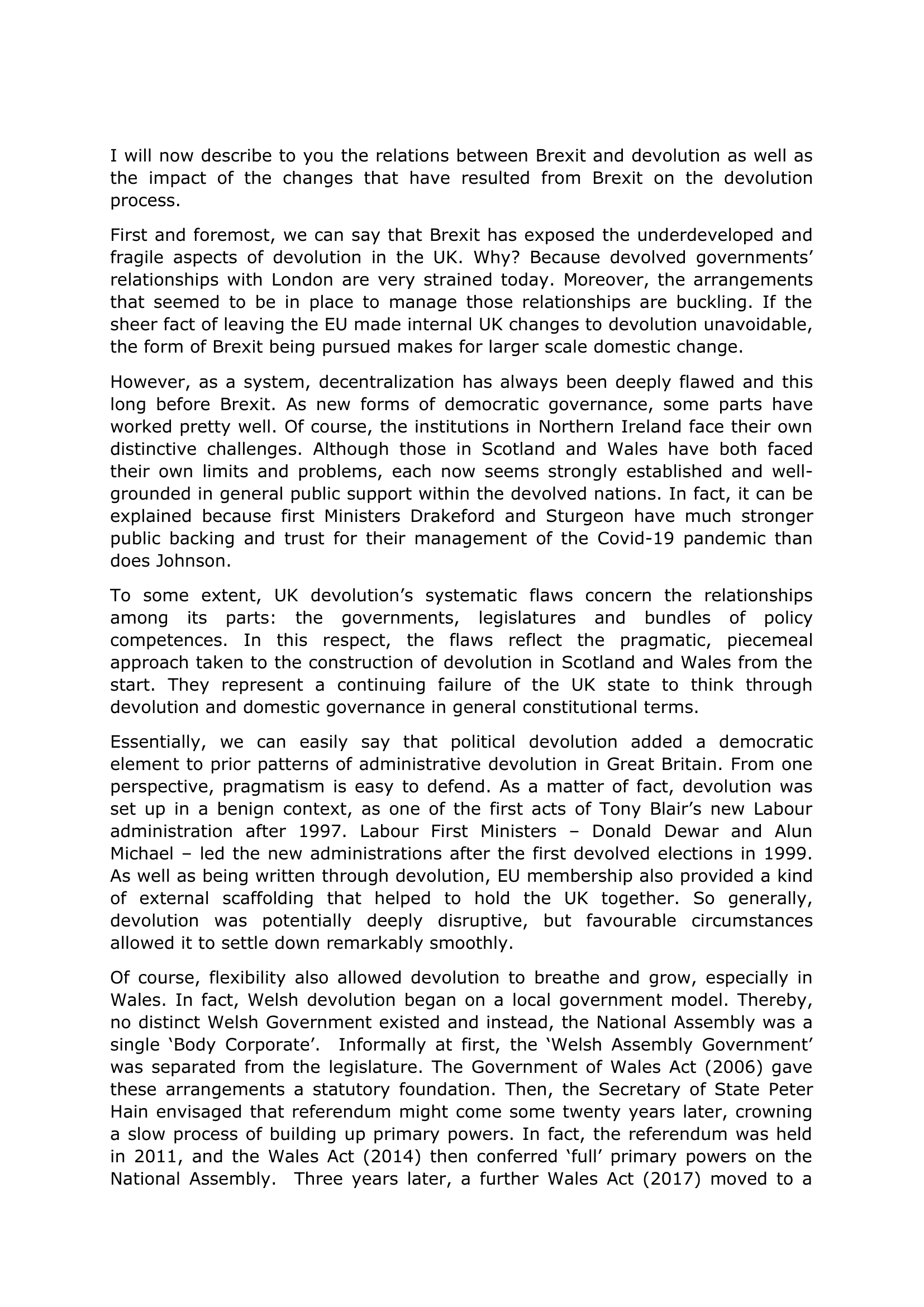Brexit and devolution
Publié le 20/02/2022

Extrait du document
«
I will now describe to you the relations between Brexit and devolution as well as
the impact of the changes that have resulted from Brexit on the devolution
process.
First and foremost, we can say that Brexit has exposed the underdeveloped and
fragile aspects of devolution in the UK.
Why? Because devolved governments’
relationships with London are very strained today.
Moreover, the arrangements
that seemed to be in place to manage those relationships are buckling.
If the
sheer fact of leaving the EU made internal UK changes to devolution unavoidable,
the form of Brexit being pursued makes for larger scale domestic change.
However, as a system, decentralization has always been deeply flawed and this
long before Brexit.
As new forms of democratic governance, some parts have
worked pretty well.
Of course, the institutions in Northern Ireland face their own
distinctive challenges.
Although those in Scotland and Wales have both faced
their own limits and problems, each now seems strongly established and wellgrounded in general public support within the devolved nations.
In fact, it can be
explained because first Ministers Drakeford and Sturgeon have much stronger
public backing and trust for their management of the Covid-19 pandemic than
does Johnson.
To some extent, UK devolution’s systematic flaws concern the relationships
among its parts: the governments, legislatures and bundles of policy
competences.
In this respect, the flaws reflect the pragmatic, piecemeal
approach taken to the construction of devolution in Scotland and Wales from the
start.
They represent a continuing failure of the UK state to think through
devolution and domestic governance in general constitutional terms.
Essentially, we can easily say that political devolution added a democratic
element to prior patterns of administrative devolution in Great Britain.
From one
perspective, pragmatism is easy to defend.
As a matter of fact, devolution was
set up in a benign context, as one of the first acts of Tony Blair’s new Labour
administration after 1997.
Labour First Ministers – Donald Dewar and Alun
Michael – led the new administrations after the first devolved elections in 1999.
As well as being written through devolution, EU membership also provided a kind
of external scaffolding that helped to hold the UK together.
So generally,
devolution was potentially deeply disruptive, but favourable circumstances
allowed it to settle down remarkably smoothly.
Of course, flexibility also allowed devolution to breathe and grow, especially in
Wales.
In fact, Welsh devolution began on a local government model.
Thereby,
no distinct Welsh Government existed and instead, the National Assembly was a
single ‘Body Corporate’.
Informally at first, the ‘Welsh Assembly Government’
was separated from the legislature.
The Government of Wales Act (2006) gave
these arrangements a statutory foundation.
Then, the Secretary of State Peter
Hain envisaged that referendum might come some twenty years later, crowning
a slow process of building up primary powers.
In fact, the referendum was held
in 2011, and the Wales Act (2014) then conferred ‘full’ primary powers on the
National Assembly.
Three years later, a further Wales Act (2017) moved to a.
»
↓↓↓ APERÇU DU DOCUMENT ↓↓↓
Liens utiles
- Ideology and Rationality in the History of the Life Sciences
- Relationship between religion, spirituality, and young Lebanese university students’ well-being.
- Course of reading and writing for 1st year English Licence
- dance and the different types of choreographie process
- Fiche de lecture sur le chapitre 11: The Greek of the New Testament, par Mark Janse, sur la section IV de l’ouvrage, intitulé: Ancient Greek: structure and change, pages 646-653.






















